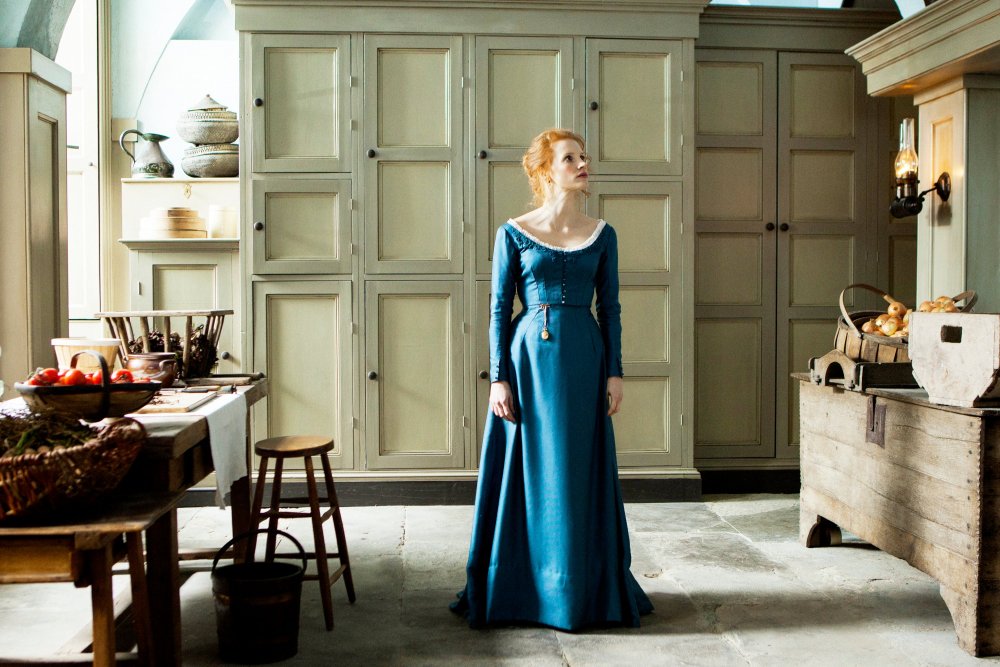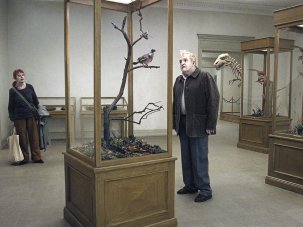If all American literature is made of tributaries of Mark Twain’s Mississippi and, as Dostoevsky had it, the whole of Russian literature came from under Gogol’s overcoat, then in the same spirit we might say that modern Swedish drama was cooked up in the kitchen where August Strindberg’s Miss Julie (1888) takes place.
Norway/United Kingdom/Ireland/France/Canada/USA 2014
Certificate 12A 130m 12s
Director Liv Ullmann
Cast
Miss Julie Jessica Chastain
John Colin Farrell
Kathleen Samantha Morton
little Miss Julie Nora McMenamy
In Colour
[1.85:1]
UK release date 4 September 2015
Distributor Munro Film Services
munrofilmservices.co.uk/films/miss-julie
► Trailer
Strindberg died in 1912, though not before the first adaptations of Miss Julie and The Father had gone before the camera, a development that no doubt interested their author; a playwright, novelist, memoirist, essayist and painter, he was also fascinated by photography, and had even invented a ‘camera’ which imprinted images (Celestographs) on photographic plates without lenses. Long after Strindberg’s death, his influence on the emerging national cinema would be inestimable. “Strindberg,” Ingmar Bergman would say, “has generally been my companion throughout life, alternately repelling and attracting me” – and it is in this combative spirit that Liv Ullmann has created her strife-racked Miss Julie.
Miss Julie is the fifth feature-length work by Ullmann, Bergman’s long-time collaborator and – in her previous film, 2000’s Bergman-scripted Faithless – the executor of his legacy. (She is Norwegian, and it transpires that she settled on Strindberg only after failing to launch a film of A Doll’s House by her countryman Henrik Ibsen.)
The most immediately evident change made to Strindberg’s play in this go-around is that the action has been moved from Sweden at the turn of the last century to Northern Ireland at the same time (the film was shot on location at Castle Coole in County Fermanagh). Strindberg’s central trio are still here: Jean (now John), the valet with arriviste fantasies and a taste for imported wines, is played by Colin Farrell; Miss Julie, daughter of the baronial manor who surrenders her maidenhead to ‘the help’, is played by Jessica Chastain; Kathleen, the cook and John’s fiancée, is played by Samantha Morton.
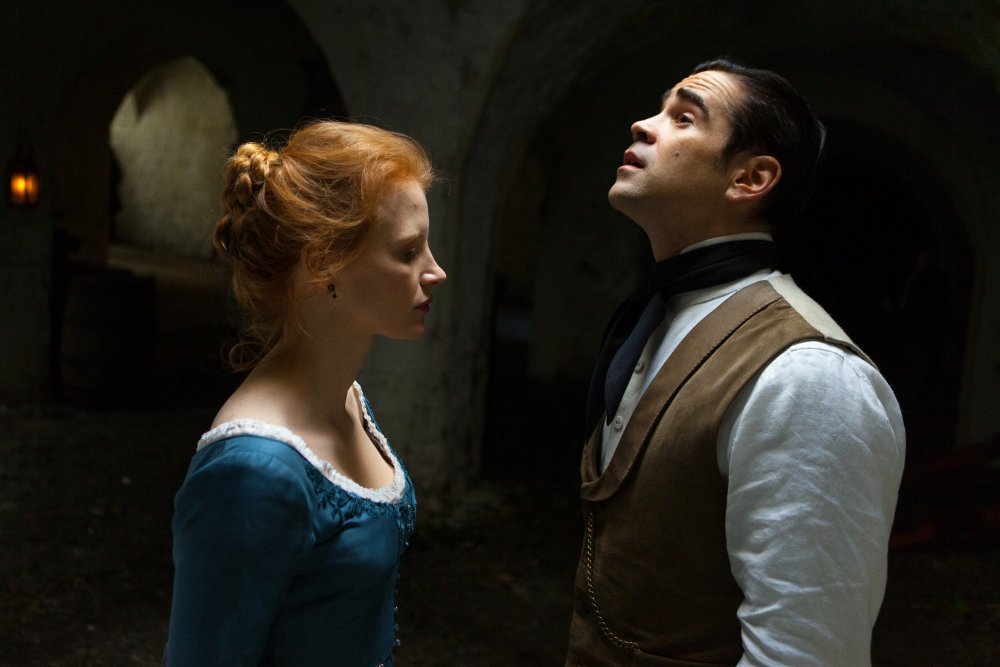
Miss Julie (2014)
What transpires between John and Miss Julie over the course of a reckless night touches on the antagonism between classes as well as between sexes – Miss Julie has the disadvantages of a woman and the advantages of an aristocrat, John the opposite package; Kathleen, a liminal character, is connected to each by solidarity to the weaker class and sex. (That Ullmann’s most recent high-profile success was a stage production of Tennessee Williams’s A Streetcar Named Desire starring Cate Blanchett, another canonical theatre piece concerning the pedestal-toppling power of desire, must certainly have helped to prepare her for Miss Julie.)
The adaptation is Ullmann’s own, and it has been done with purpose and intelligence. The action, confined to the manor’s kitchen in the play, has been opened up to incorporate the servants’ quarters and the grounds of the estate – the latter features in a sort of overture in which we see Miss Julie as a little girl wandering among the greenery, as well as in a coda in which we follow her in her final walk out of the kitchen door, concluding in a rapturous image that suggests the pre-Raphaelites. Unlike Alf Sjöberg’s 1951 production, Ullmann’s Miss Julie has no recourse to picturesque peasantry or incidental characters – we are trapped with the trio, who are trapped with each other. (Sjöberg’s film was shot by one Göran Strindberg, a relation – the parochial smallness of the Swedish industry cannot be overstated.) All references to Miss Julie’s previous betrothal, to her or Jean’s bloodlines as keys to their actions and to her reckless boldness being occasioned by menstrual madness have been heavily altered or removed altogether.
Strindberg’s dramas of this period tend to be structured as a slow simmer built to a boiling-point – at the Brooklyn Academy of Music I saw an Alan Rickman production of Strindberg’s 1889 play Creditors with Tom Burke and Owen Teale in which the entire cast appeared to be on the verge of thrombosis by the time the curtain was ready to fall – and Ullmann’s Miss Julie is, similarly, a harrowing affair, not to mention much the most bibulous version of the material I’ve seen, with the judgement-impairing effects of each dram visible on the way to overflow. It’s a gladiatorial encounter, and by the red-eyed end of John and Julie’s sleepless night, you have the feeling of looking at people who’ve been crawling on hand and knee through rending thickets.
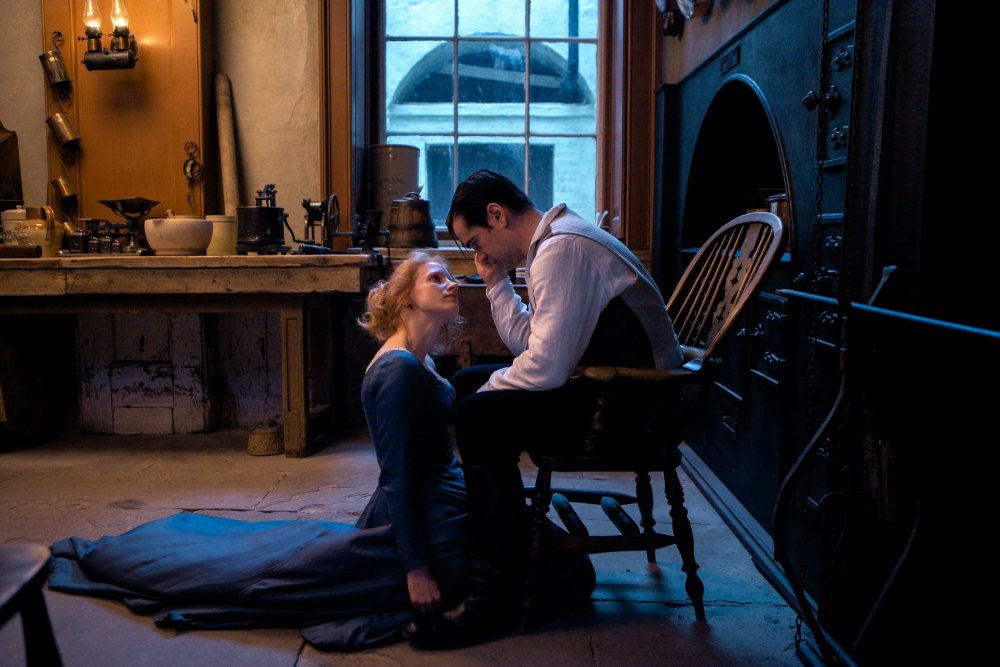
Miss Julie (2014)
However antagonistic Bergman’s relationship with Strindberg may have been, there must inevitably be an additional wrinkle to Ullmann’s reckoning with Miss Julie, for Ullmann is of course a woman, and anyone who has read her autobiography Changing knows she’s a woman acutely aware of the particular challenges of the female artist. In contending with Strindberg, Ullmann is approaching a sworn enemy of her sex. Molly Haskell, in her groundbreaking 1974 study From Reverence to Rape: The Treatment of Women in the Movies, encapsulated the general consensus when she referred to Strindberg as a “legendary misogynist”, and although this necessarily succinct judgement simplifies the author’s rather more complex and contradictory opinions, it’s sufficient to say that the man who once wrote that the female of the species was “useful only as ovary and womb” is what the young folks today like to call a ‘problematic’ figure.
But, as Haskell observed, it is often the director who loves or worships women who’s most to be suspected, and in voicing and interrogating his own fear and hostility towards women in a Victorian society that claimed to revere them despite a great deal of evidence to the contrary, Strindberg tacitly challenged the myth of the ‘weaker sex’, revealing the barely suppressed violence governing male-female relations. In expressing his own misogyny, he also exposed that of society at large, and gave the whole game away. None of which is to reclaim Strindberg as any sort of feminist, but only to say that he was an artist of the first order, and a hypersensitive medium for truths whose full implication future generations would wrestle with. Such a contentious, irascible artist demands not cautious, faithful interpretation but confrontation, and he has found his match.
Ullmann, with her Russian cinematographer Mikhail Krichman (Elena, Leviathan), gives a masterclass in mise en scène determined by the rigid social system of decorum – the physical toll exerted by violating it; the momentary, emboldened giddiness that follows the overturning of taboo; and the dangerous, unforeseeable psychological after-effects of the upending transgression, which removes the keystone holding together an entire worldview.
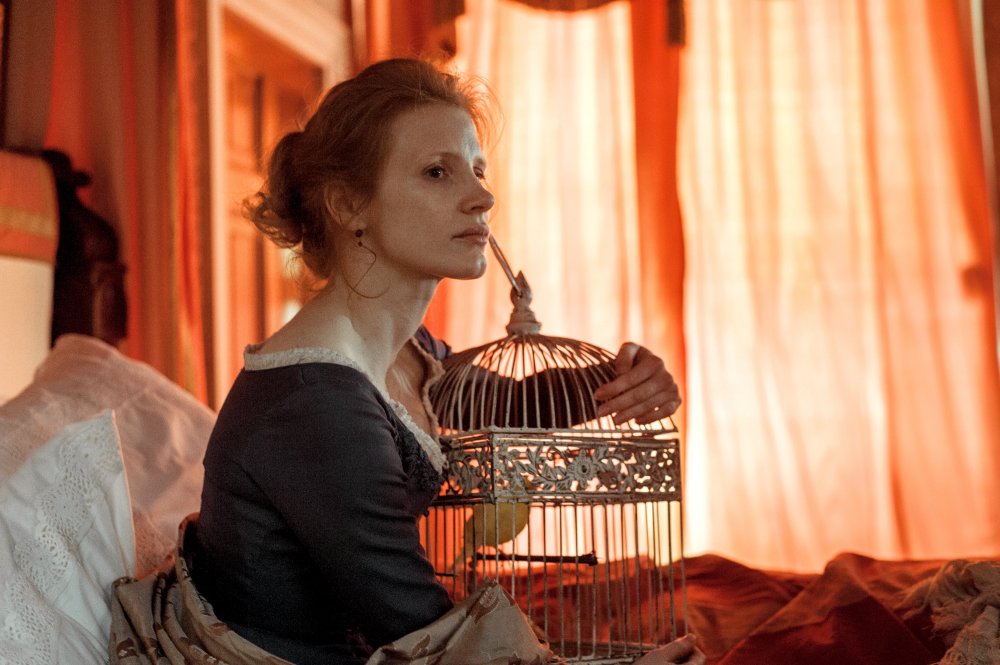
Miss Julie (2014)
Under the hard, fixed gaze of Chastain’s Miss Julie, Farrell’s John can at first only nervously dart his eyes this way and that, and he has a marvellous moment early on when, invited to enter the main hall of the manor by Miss Julie, he stops dead at the threshold as if bouncing off a force field. It’s an instant to be treasured, along with Chastain’s unsteady, wounded walk after her deflowering; or her first, abject drop to the kitchen floor, a marionette with strings clipped.
Both performances are what is described as awards-worthy, which is perhaps why the US distributor thought to dump Miss Julie into the December scrum, where it disappeared without trace. The same absurd, unexamined prejudices against ‘filmed theatre’ that dogged Bergman throughout his career may also have played a part in the dismissal of Ullmann’s film – but there isn’t a better piece of pure cinema out there.
-
Sight & Sound: the October 2015 issue

The Female Gaze: 100 underrated films directed by women, with contributions from Agnès Varda, Jane Campion, Claire Denis, Isabelle Huppert, Tilda...
-
The Digital Edition and Archive quick link
Log in here to your digital edition and archive subscription, take a look at the packages on offer and buy a subscription.




